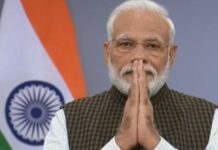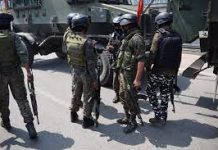The US President Donald Trump’s decision to impose sanctions and unilaterally exit the Iran deal is not a good decision and except Saudi Arabia and Israel, the rest of the world has criticised the decision. The decision should be a reason for India to feel concerned and worried. The US President has threatened to re-impose sanctions and if Tehran declines to renegotiate it could affect India in many spheres including petroleum, ports, shipping and banking. Trump’s decision to pull out of the Iran nuclear deal is also bad news for the oil market, remittance income flows from West Asia, India’s current account deficit and the value of the rupee and inflation.The US President Donald Trump’s decision to impose sanctions and unilaterally exit the Iran deal is not a good decision and except Saudi Arabia and Israel, the rest of the world has criticised the decision. The decision should be a reason for India to feel concerned and worried. The US President has threatened to re-impose sanctions and if Tehran declines to renegotiate it could affect India in many spheres including petroleum, ports, shipping and banking. Trump’s decision to pull out of the Iran nuclear deal is also bad news for the oil market, remittance income flows from West Asia, India’s current account deficit and the value of the rupee and inflation.India needs to work with countries with a shared interest to ensure that Trump’s exit from the Iran deal does not harm its investments and plans in the region.
PM Narendra Modi will get the opportunity to discuss the issue with like-minded leaders when he meets them for two multilateral summits. But the bigger worry is the increased likelihood it imposes on the West Asian region of yet another war that would plunge the region into active Shia-Sunni hostility and give new life to an Islamic State currently on the wane. By threatening sanctions and an imminent exit from the Iran deal, the US is doing serious damage to its own leadership of rule-based internationalism and driving the Europeans to create their own geopolitical identity. As a repercussion, the move would further help China in positioning itself as the focus of resistance to American arbitrariness.India would do well to take a stand that can be justified on principle, rather than go by the number of defence contracts the country has with Israel and the US, the two main protagonists in a tiny camp that will face Europe, Russia, China and most of the rest of the disapproving world. It is a foregone conclusion that as America re-imposes sanctions on Iranian links, the Europeans would have to buck the dollar dominance of global finance to offer real resistance. Would they be prepared to go that far, even with open support from China or follow in the footsteps of Donald Trump? The question is whether Europe and other powers will stick together to respect the mandate of an international agreement or buckle under American pressure. Since the Europeans are convinced that for the US to unilaterally withdraw from the deal is the height of irresponsibility, they would have to put up some credible resistance. If Israel and the US stage pre-emptive strikes on Iran to thwart bomb-making, armed unrest and war would spread across the region. Trump has made a very bad, horrible decision. India must say so.President Donald Trump’s move is a huge setback to multilateral diplomacy and the rule-based international order. Under the Iran deal, signed in 2015 with the five permanent members of the UN Security Council, most of Iran’s enriched uranium was shipped out of the country, a heavy water facility was rendered inoperable and the operational nuclear facilities were brought under international inspection. In July 2015, when Barack Obama was at the helm, the US, the UK, Iran, China, France, Russia, Germany and the European Union adopted the so-called Joint Comprehensive Plan of Action (JCPOA), under which Iran would eliminate stockpiles of enriched uranium in return for lifting nuclear-related economic sanctions. In Iran, the moderate government of President Hassan Rouhani went ahead with the deal despite strong opposition from hardliners.
Trump has just wrecked all these efforts, despite numerous reports, including from American intelligence agencies, that Iran is 100% compliant with the terms of the agreement. When the JCPOA was signed, many had raised doubts about whether Iran could be trusted to comply with the terms. Three years later, unfortunately, it’s the US, which had initiated talks with Iran under the previous administration that has acted to break the deal. If we read between the lines, Donald Trump’s decision is not about nuclear weapons alone. If his administration was actually concerned about Iran acquiring them, it would have supported a deal that closes the path towards nuclear weapons for Iran. Instead, the bigger concern for Trump is Iran’s re-accommodation in the global economic mainstream. They fear that if Iran’s economic profile rises, it will embolden it to increase its regional presence, posing a strategic threat to the interests of the U.S.-Saudi-Israel axis. Trump has always been a critic of the Iran deal and the Islamic. Since his 2016 election campaign, Trump has opposed the deal, calling it a “disaster” and “one-sided”. He had observed that if the deal continued to stand, there would soon be a nuclear arms race in West Asia. Now, by pulling out of the deal he has manufactured a crisis in an already volatile region. Significantly, the agreement, for now, will still stand as Europe, Russia and China remain committed to it. Iran has responded cautiously, with the Foreign Minister saying he will engage diplomatically with the remaining signatories. But the challenges will emerge, not only for Europe but also for other nations with strong trade ties with Iran, including India, once American sanctions are in place. The US stands isolated in its decision.
Implications Oil prices are likely to rise and could lead to volatility in the financial markets. The US has given European companies six months to wind up their businesses in Iran or face sanctions. Trump said that any country that helps Iran in its quest for nuclear weapons could face sanctions. Experts say the hard line will give Trump an upper hand while negotiating with North Korean leader Kim Jong-un. In the run-up to the announcement, European leaders had lobbied for continuing the accord. The UK, France and Germany have expressed concern and regret over the decision and have committed to stay in the deal. French President Emmanuel Macron tweeted that “the nuclear non-proliferation regime is at stake”. These nations have urged Iran to continue to meet its own obligations of the deal.Iranian President Hassan Rouhani is treading cautiously and has asserted his commitment to the deal. “I have ordered the foreign ministry to negotiate with the European countries, China and Russia in coming weeks. If at the end of this short period we conclude that we can fully benefit from the JCPOA with the cooperation of all countries, the deal would remain,” he said in a speech. However, experts fear that in case of failure in reaching any deal, Iran may resume uranium enrichment. Trump’s decision could also give hardliners who opposed the deal an edge over Rouhani.
Impact on IndiaFor India it is like “to be or not to be” but it appears that India may continue to import Iran’s oil. The relationship between the two goes beyond energy. India has committed more than $500 million to develop Chabahar port, which gives India access to Afghanistan, bypassing Pakistan. Dozens of pacts on trade, regional connectivity and investment were signed during Rouhani’s India visit in February. While the US decision may have implications on India’s foreign policy, trade relations are unlikely to be impacted. After 2015, both nations agreed to pay for investments with the rial and the rupee, cutting their reliance on the dollar.
Missile attacks beginWithin 24 hours of Donald Trump’s announcement both Damascus and Riyadh experienced missile attacks. Military analysts have warned that by leaving the agreement, the US move could serve to isolate Tehran at a time when it is engaged in multiple conflicts across the Middle East. Israel has already placed troops in the area on high alert amid fears it may be targeted by Iranian forces operating across the frontier. Syria’s largest airbase, T-4, is believed to be the focus of Iran’s drone presence in its Arab neighbour. Idlib has seen an increase in bloodshed as Syrian and Russian jets have bombed rebel-held positions. A Saudi-led coalition is fighting the Iran-allied Houthi movement in Yemen, morphing the deadly civil conflict into a regional proxy war.
Key countries affectedThe key players in the region and the regions where violence could flare include Iran, Israel, Saudi Arabia, Syria, Lebanon, Yemen, Iraq, Turkey and Qatar. Iran has been accused by its enemies of attempting to create a crescent of influence stretching from its border to the Mediterranean, through allies in Iraq, Syria and into Lebanon where its proxy, Hezbollah, has consolidated power. Early in Syria’s devastating seven-year civil war, Shia Iran sent tactical advisers to support President Bashar al-Assad. Since then, Tehran has entrenched its military in the country, deploying drone operators and fighters from the Islamic Revolutionary Guards Corps. In February, Israel said it downed an armed Iranian drone that penetrated its airspace. Israel’s prime minister Benjamin Netanyahu is one of the most vociferous critics of the Iran deal and has even been credited with helping convince the US president to pull out of the same. Netanyahu has long warned of an impending war with Iran, accusing his arch-nemesis of attempting to establish a permanent military foothold in Syria. But, while repeatedly warning of Iranian plots to attack, it is Israel that appears to have led the charge with several reported strikes on Tehran’s forces in Syria this year. Shortly after Trump announced that the US would withdraw from the Iran deal, Syria state media said air defences had downed two Israeli missiles. Saudi Arabia is locked into several proxy wars across the Middle East with Iran, which for a long time were centred in Syria, where the region’s two most powerful states have exploited sectarian Sunni-Shia Muslim splits. Last year, Iran-backed Houthi militants began firing missiles at Riyadh, bringing the fight to the kingdom’s capital, with the latest salvo launched on Wednesday. As part of its anti-Iran push, the Saudi leadership has welcomed Trump’s move to re-impose sanctions on Iran. The Syrian civil war has torn up the country as world powers have moved to support opposing factions fighting for control. In its campaign to push back what it sees as Saudi influence, Iran has established itself as a key player in the war, mostly operating through pro-Assad militia spread across the battered state. Israel says Iran has recruited tens of thousands of Shia fighters in Syria. The Lebanese militant and political group Hezbollah has long been the tool used by its patron Iran to push its agenda far from its borders. Israel and Hezbollah fought a month-long war in 2006 and Israeli defence officials have warned that Iran is delivering missiles and rockets to the group via a land route with Syria. Saudi Arabia and its adversaries in Yemen’s armed Houthi movement are fighting a three-year war that has unleashed one of the world’s worst humanitarian crises. A Riyadh-led coalition, supported by the US and Britain, has launched air strikes that have killed scores of civilians. Iran does not acknowledge its direct military involvement in Yemen but is widely believed to be supporting the Houthis. On May 9 this year, Saudi Arabia said Houthi rebels fired a salvo of ballistic missiles at Riyadh that was c intercepted over the capital city. By arming and training thousands of Shia militants in Iraq, Tehran sought to push back Islamic State fighters, who seized much of the war-torn country in 2014. These factions remain armed and powerful in Iraq, while Tehran seeks to bolster the country’s fragile government. The Turkish president has said the US would “lose in the end” for withdrawing from the landmark 2015 Iran nuclear agreement and warned that the move could create “new crises in the region”. Isolated in the Gulf, Qatar clashes with the other Arab states. Saudi Arabia, the UAE, Bahrain and Egypt imposed an economic and diplomatic boycott on the small but rich nation last year, accusing it of supporting Islamist militants and aligning itself with Iran. Qatar denies the accusations but relations with its neighbours remain tense, although it has restored diplomatic links with Tehran. With all this, it is obvious that the Trump’s decision is bound to open the Pandora’s Box and sure to incite passions in the region.
letters@tehelka.com













